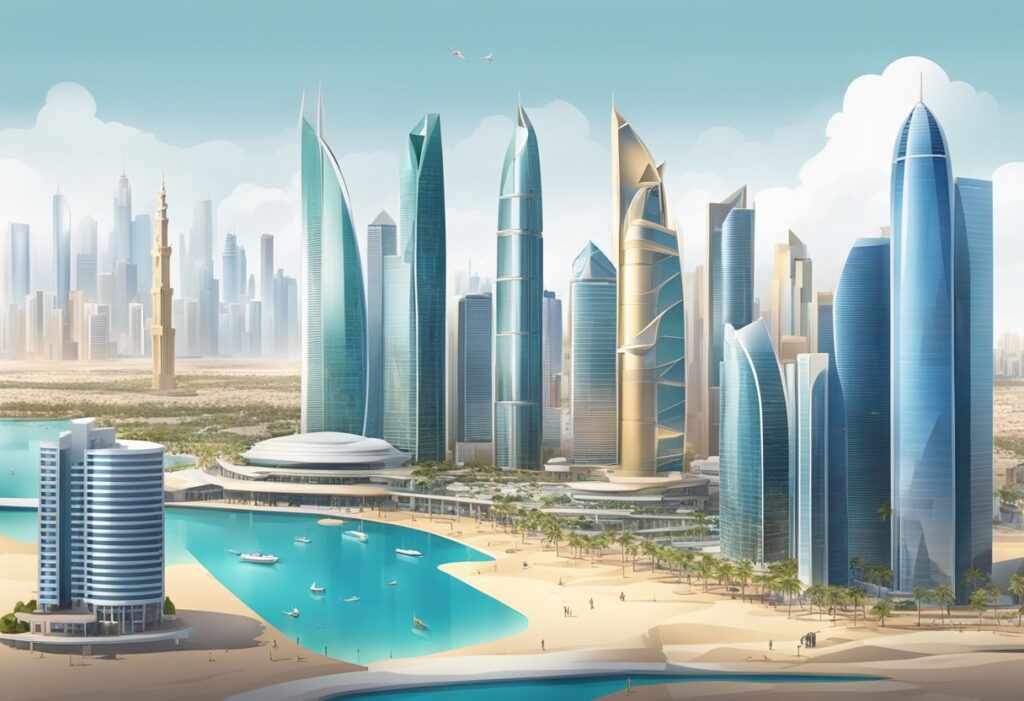Abu Dhabi, the capital of the United Arab Emirates, is aiming to become the world’s top arbitration venue of choice, according to recent reports. The city is already a leading center for international arbitration, with its Abu Dhabi Global Market Arbitration Centre (ADGMAC) attracting a growing number of cases from around the world.
The ADGMAC was established in 2015 as part of Abu Dhabi’s efforts to diversify its economy and establish itself as a global hub for business and finance. Since then, it has become one of the most respected arbitration centers in the world, offering a range of services and facilities to help parties resolve disputes quickly and efficiently.
Abu Dhabi’s focus on arbitration and dispute resolution is part of a broader strategy to attract investment and promote economic growth. By providing a reliable and efficient platform for resolving disputes, the city hopes to encourage more businesses to set up shop in the region, and to position itself as a leading center for international commerce.
Establishing Abu Dhabi as a Premier Arbitration Hub
Abu Dhabi, the capital of the United Arab Emirates (UAE), has been making significant strides towards becoming the world’s top arbitration venue of choice. This has been made possible by the government’s efforts to create a legal infrastructure that is conducive to arbitration, as well as the establishment of institutions such as the Abu Dhabi Global Market (ADGM) and the Emirates Maritime Arbitration Centre (EMAC).
Legal Infrastructure and Arbitration Framework
Abu Dhabi has a robust legal framework that supports arbitration. The Federal Arbitration Law, which was enacted in 2018, provides a comprehensive legal framework for arbitration in the UAE. The law is based on the UNCITRAL Model Law and is in line with international best practices. Additionally, Abu Dhabi has a court of arbitration that is responsible for the administration of arbitration proceedings.
Abu Dhabi Global Market and International Financial Centre
The ADGM is a financial free zone that was established in 2015. It has its own common law-based legal system and operates independently of the UAE’s civil law-based legal system. The ADGM has its own arbitration rules, which are based on the UNCITRAL Model Law. The ADGM has been successful in attracting foreign investment and is home to numerous international businesses.
Role of the ICC and Other Arbitral Institutions
The International Chamber of Commerce (ICC) has a presence in Abu Dhabi and is one of the leading arbitral institutions in the world. The ICC has its own arbitration rules and has been involved in numerous high-profile arbitration cases. Other arbitral institutions that have a presence in Abu Dhabi include the Dubai International Arbitration Centre (DIAC) and the DIFC-LCIA Arbitration Centre.
In conclusion, Abu Dhabi has made significant progress in establishing itself as a premier arbitration hub. Its legal infrastructure and arbitration framework, along with the presence of institutions such as the ADGM and the ICC, have made it an attractive destination for international businesses and arbitrators. The UAE’s commitment to arbitration is evident in its adoption of the Federal Arbitration Law and its efforts to create an arbitration-friendly environment.
Enhancing the Arbitration Ecosystem

Abu Dhabi has been making significant strides in its quest to become the world’s top arbitration venue of choice. One of the key factors driving this ambition is the enhancement of the arbitration ecosystem. This section explores some of the measures that have been taken to achieve this goal.
Promoting International Best Practices and Neutrality
Abu Dhabi has been actively promoting international best practices in arbitration. The Emirate has adopted the UNCITRAL Model Law on International Commercial Arbitration, which provides a modern and flexible legal framework for arbitration. This has helped to ensure that the arbitration process in Abu Dhabi is in line with international standards.
In addition, Abu Dhabi has been emphasizing the importance of neutrality and impartiality in arbitration. The Emirate’s arbitration institutions have been working to ensure that arbitrators are independent and not biased towards any party. This has helped to build trust in the arbitration process and has made Abu Dhabi an attractive destination for international dispute resolution.
Strategic Partnerships and Global Recognition
Abu Dhabi has been forging strategic partnerships with leading arbitration institutions around the world. This has helped to raise the profile of Abu Dhabi as a global arbitration hub. For example, the Abu Dhabi Global Market (ADGM) has signed memoranda of understanding (MOUs) with the Singapore International Arbitration Centre (SIAC), the Hong Kong International Arbitration Centre (HKIAC), and the China International Economic and Trade Arbitration Commission (CIETAC), among others.
Abu Dhabi has also been gaining global recognition for its arbitration services. The International Chamber of Commerce (ICC) Court President, Alexis Mourre, has praised Abu Dhabi’s case management teams and its commitment to providing quality dispute resolution services. The Queen Mary University of London’s 2021 International Arbitration Survey ranked Abu Dhabi as the second most preferred seat for cross-border disputes in the MENA region.
Future Prospects and Development
Abu Dhabi’s arbitration ecosystem is set to continue its growth and development. The Emirate recently issued Decree No. 34 of 2021, which amended the DIFC Arbitration Law to allow parties to opt for virtual hearings. This move has helped to make the arbitration process more efficient and accessible.
Abu Dhabi is also home to a number of leading arbitration institutions, such as the Abu Dhabi Commercial Conciliation and Arbitration Centre (ADCCAC), the Dubai International Arbitration Centre (DIAC), and the Emirates Maritime Arbitration Centre (EMAC). These institutions offer a range of alternative dispute resolution services, including mediation and conciliation.
In conclusion, Abu Dhabi’s efforts to enhance its arbitration ecosystem have helped to establish the Emirate as a leading destination for international dispute resolution. With its commitment to promoting international best practices, strategic partnerships, and ongoing development, Abu Dhabi is well-positioned to become the world’s top arbitration venue of choice.








